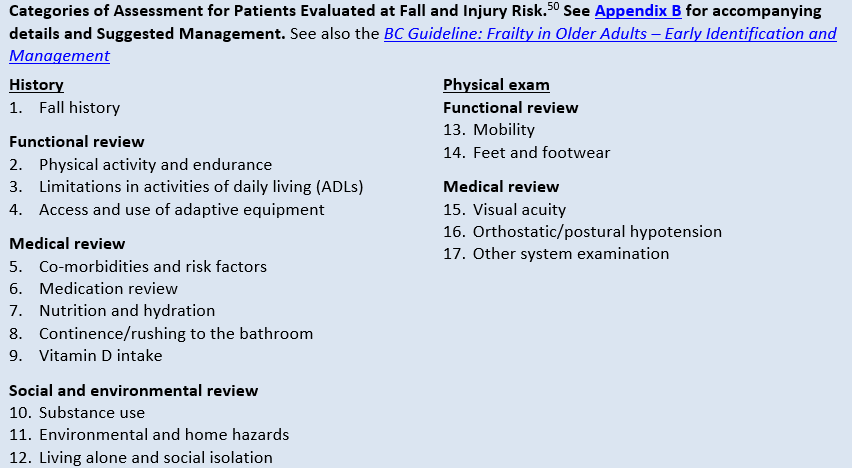Rumored Buzz on Dementia Fall Risk
Rumored Buzz on Dementia Fall Risk
Blog Article
Dementia Fall Risk Fundamentals Explained
Table of ContentsDementia Fall Risk Can Be Fun For EveryoneThe 7-Minute Rule for Dementia Fall RiskDementia Fall Risk for DummiesExcitement About Dementia Fall RiskDementia Fall Risk Can Be Fun For Everyone
Based on indications and signs and symptoms, such as evidence of head injury or a new focal neurologic deficiency, calculated tomography or MRI of the mind might be indicated. An evaluation for root causes of syncope should be conducted just if there is solid suspicion, as in the situation of persistent, unexplained drops
Medical care providers use a loss risk analysis to determine your threat variables for falling and make helpful recommendations. Some individuals try to minimize their fall risk by restricting their task or making every effort to be much more careful. Yet these sympathetic habits aren't sufficient. A fall risk assessment is essential because understanding which variables increase your chances of dropping helps you: Reduce your risk of dropping or harming on your own.
All adults 65 years and older must have an initial loss danger screening. Have fallen in the past year. Worry concerning falling.
All about Dementia Fall Risk

Discover this thorough nursing treatment plan and monitoring overview to efficiently stop threat for drops among patients. Acquire crucial expertise regarding the nursing assessment, taking care of medical diagnosis, and goals specifically customized to individuals that go to danger for drops. A is specified as an occasion that leads to a person coming to relax unintentionally on the ground or floor or other reduced level (THAT, 2021).
Dropping is the 2nd leading cause of fatality from unintentional injuries internationally. It is estimated that autumn fatality rates in the U.S
The smart Trick of Dementia Fall Risk That Nobody is Discussing
If right here this rate proceeds, the CDC expects 7 autumn deaths every hour by 2030.
Yearly, over 800,000 individuals are hospitalized due to drops. Nurses play a significant duty in avoiding drops for their individuals through education and learning, assessing fall threat, producing safer environments, and giving interventions in protecting against injuries from drops. A number of risk factors and conditions add to falls, consisting of the following:. Aged 65 years and older; lower limb prosthesis; use assistive gadgets such as walker, crane, link and mobility device; living alone.
Person will certainly show discerning avoidance actions. Person and caregivers will apply strategies to raise safety and protect against falls in the home. Autumns result from a number of factors, and an all natural approach to the private and atmosphere is essential. Suppose an individual is considered at high threat for falls after the screening.
Not known Factual Statements About Dementia Fall Risk
A requires utilizing a verified tool that scientists have examined to be helpful in calling the sources of falls in a person. As an individual's health and wellness and conditions change, review is required. The degree of loss threat can be established utilizing the analysis of innate and extrinsic factors. Criterion assessment devices can likewise be utilized (talked about below).
People are a lot more likely to drop again if they have sustained one or even more drops in the past 6 months. The older population is at boosted risk of fall-related readmissions based on a study determining the variables predictive of repeat falls linked end results (Prabhakaran et al., 2020).
In addition, confusion and damaged judgment raise the patient's chance of falling. The capability of individuals to protect themselves from falls is impacted by such aspects as age and development. Older people with weak muscles are more likely to drop than those who maintain muscular tissue toughness, adaptability, and endurance. These changes include decreased visual feature, damaged color perception, adjustment in center of mass, unsteady stride, decreased muscle mass toughness, lowered endurance, transformed depth understanding, and delayed feedback and response times.
The Facts About Dementia Fall Risk Uncovered
Much less contrast sensitivity was quite connected with both Read Full Article boosted prices of drops and various other injuries, while reduced visual skill was only connected with increased autumn rate (Wood et al., 2011). Sensory understanding of environmental stimuli is extremely important to safety. Vision and hearing problems limitation the client's capability to perceive hazards in the surroundings.
Older adults that have poor equilibrium or trouble strolling are extra likely to fall., or various other clinical problems and treatments., and usage of psychotropic medications (Stanmore et al., 2013).
Report this page